While working at JP Morgan Chase in New York City, one of Aditya Parikh’s favourite snack stops for a four-cheese pizza was Jianetto’s, a food truck parked right below the corporate centre
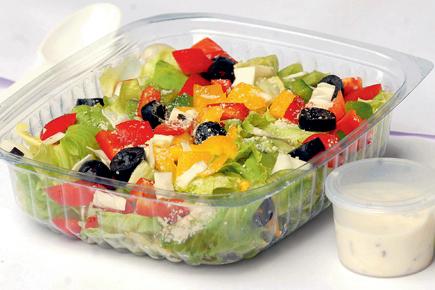
The Caesar salad served at Paninaro
While working at JP Morgan Chase in New York City, one of Aditya Parikh’s favourite snack stops for a four-cheese pizza was Jianetto’s, a food truck parked right below the corporate centre. On other days, it was The Halal Guys, popularly known as Chicken and Rice in NYC, on 53rd and 6th. When he was craving Chinese, he’d head to the truck parked at 47th and Madison. On days he was missing home, he’d buy a dosa from Dosa Man parked at a corner of Washington Square Park. “You name it, and you’d get it at one of the food trucks on New York’s streets,” says the 34-year-old.
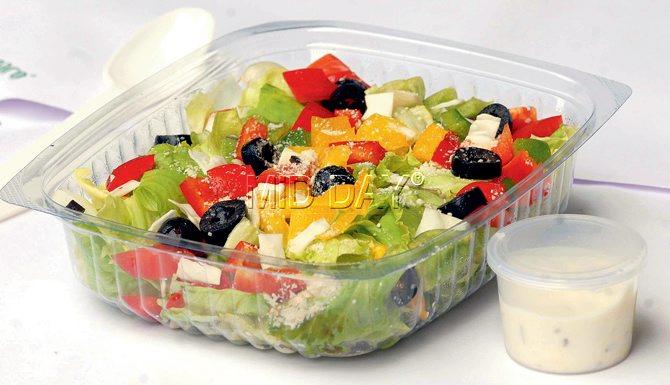
The Caesar salad served at Paninaro
ADVERTISEMENT
When he returned home in 2006, he began researching the potential of the food truck business in Mumbai. By 2009, he had Paninaro up and running, serving specialised salads, sandwiches and paninis at affordable prices.
Parikh imagined that with time, his trucks would roam the commercial centre of Nariman Point by day and head to Malad at sundown. Six years later, he has just one truck that stations itself outside Solitaire Corporate Park in Chakala, but he has managed to set up four brick-and-mortar outlets across the city.
Although food trucks seem the perfect fit for a city strapped for space and time, it’s a business that young entrepreneurs say is proving to be a challenge to run. Although the concept allows hospitality professionals to circumvent Mumbai’s astronomical real-estate rates, the run between BMC offices and RTOs makes Parikh claim that we are not ready for a trend that became a hit in global metros a long while ago. The numbers prove he is right. NYC has an estimated 10,000 operational food trucks. Mumbai has 10. In comparison, Gurgaon and Bengaluru have provided fertile ground for gourmet food trucks like Spitfire BBQ (juicy pork ribs), EggJactly (for breakfast) and Frugurpop (gourmet popsicles).
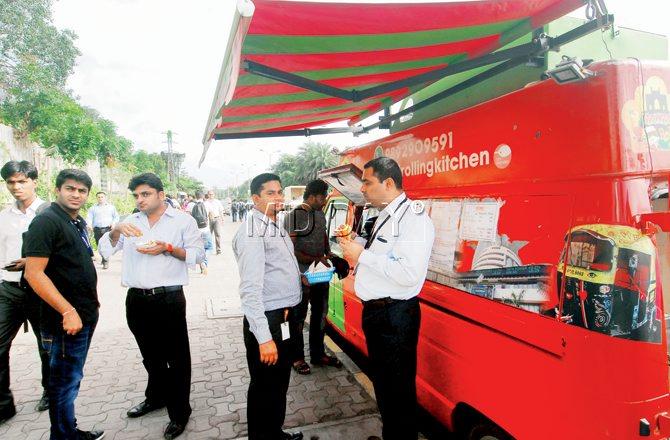
Mumbai can’t walk
With its extravagant rentals, South Mumbai is not only out of reach for most restaurateurs, it’s also a nightmare for food truck owners. “A car breaks down at Peddar Road and traffic piles up till Marine Drive. Imagine parking a food truck on roads like these,” says Parikh.
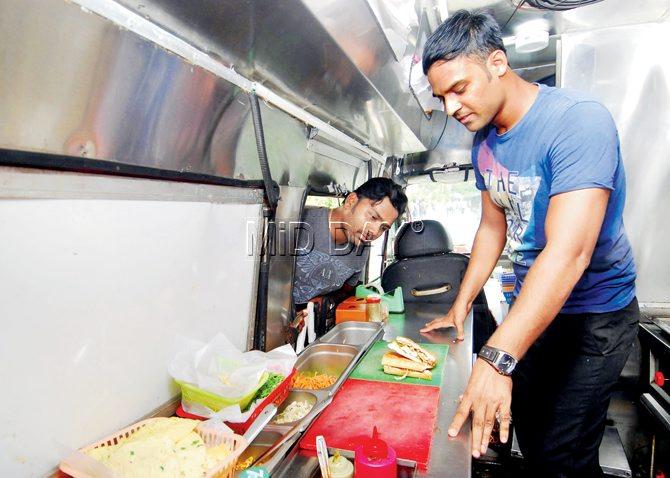
It cost Sagar Waghule (left), Suraj Kurkute (right) and Sudhir Kanse, who run Mumbai Rolling Kitchen outside corporate center Mindspace in Airoli, R12 lakh to convert a Tata Winger into a fully equipped, fire proof food truck. Pics/Sameer Markande
It is the fear of heavy traffic on narrow stretches that made the men behind Mumbai Rolling Kitchen opt for Airoli, with roads that are wide, ample sidewalks and sectors that are well demarcated. Launched by London-returned trio Sagar Waghule, Suraj Kurkute and Sudhir Kanse, the red-and-green food truck has a wind turbine ventilator, water tank and grills. It draws its awning out every evening outside the corporate centre Mindspace to serve burgers, sandwiches, rolls and fries. Most of its customers are aged 21 to 35 and head here during a smoke break or at lunch time or on their way back home.
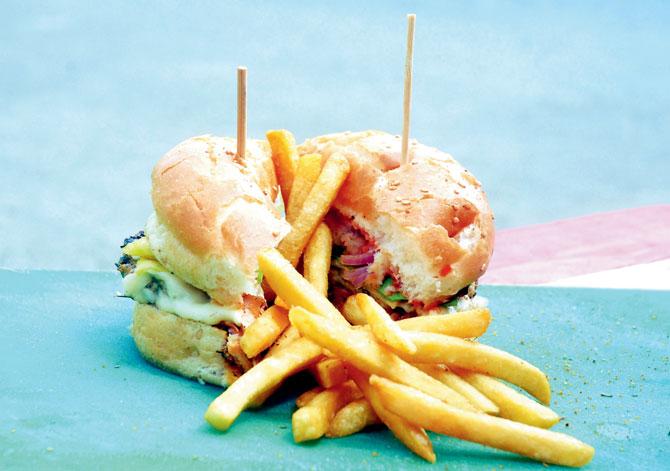
Waghule, 28, who has experience of having worked as restaurant manager in Abu Dhabi, says, “The initial plan to launch a brick-and-mortar outlet was thwarted by the financial investment required.” But he admits that upping a regular Tata Winger into a fire-proof food truck cost them a pretty penny — R12 lakh to be exact. “Word-of-mouth publicity, loyal clientele and ownership of a market, we hope, will help us set up a restaurant soon,” says Kurkute.
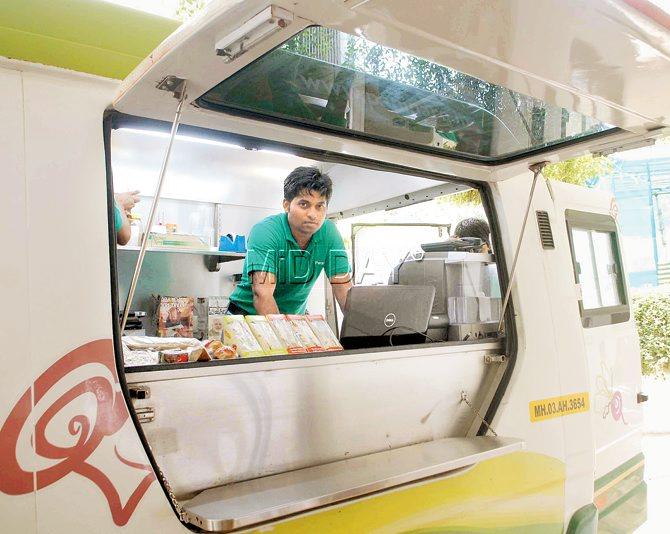
While Paninaro has managed to launch a single food truck in six years, stationed at Solitaire Corporate Park in Chakala, it has opened four brick-and-mortar outlets in the same time. Pic/Shadab Khan
Mumbai Rolling Kitchen hopes to add one more truck by next year to feed the suits at Patni iGate, a corporate park in the neighbourhood. Sometimes, even wide roads aren’t of help when parking restrictions make food trucks behave like pop-up restaurants, unable to stick to one regular stop.
Hitesh Bhatia, food entrepreneur and head of the TiE Food Network, saw more than 15 pitches for food trucks last year. Most were forgotten. He ascribes the city’s resistance to food trucks to the lack of a walking culture. “In Bengaluru, there are roads to walk along. Gurgaon has ample space too. Who walks leisurely in Mumbai? Where is the space to do it? I cannot imagine people crowding around a food truck in the midst of traffic,” he says. And if they do, they are at the mercy of resident associations and RTO officials.
The way out, says Parikh, is for a public bidding of parking spots, similar to the one conducted in New York. The system supports small mom-n-pop food trucks by offering concessions while premium parking spots are handed out to the highest bidders. The city, in turn, provides the snacking culture with not just a registered spot but also drainage and electricity tap off points. All wasn’t hunky dory though, with the bidding model turning food trucks into a cash cow, and some spots going for six figures just so that someone can sell hotdogs close to Central Park.
Struggle of logistics
Vikram Sood, a business innovation consultant who has been independently researching the food truck industry in India, calls Mumbai a “logistical nightmare”. Add to that the licensing ambiguities. In an attempt to find a solution, Sood is working on a low-cost entry model for emerging food truck entrepreneurs that will contest the bidding model which is likely to encourage rigging.
Going as far as to imagine establishing a Food Trucks Association, similar to those in NYC and New Orleans, he says, the bigger concern is the limbo entrepreneurs find themselves in when they approach authorities for required licences.
Since the Brihanmumbai Municipal Corporation, the city’s civic body, is yet to stay ahead of the trend and devise a food-truck licence, most operators work around the hurdle by acquiring a bouquet of licences.
These include a gumasta or shop establishment licence, the FSSAI license for a delivery vehicle, a Registration Certificate from the RTO and an NOC from the Fire Department.
Nachiket Shetye, director, Restaurant Week India, is optimistic and hopes those invested in the business will push for a thorough and all-encompassing license to be readied, in the manner that microbreweries did to make room in a system that didn’t allow industry of any kind to be set up with city limits.
Dishing it right
In the meanwhile, those who man the kitchens hope that the quality of fare offered in Mumbai is taken a notch higher. Food blogger Perzen Patel, who is readying to offer a curated selection of Parsi dishes from a food truck, says Mumbai’s food truck scene is glorified. “A food truck cannot be about great dosas. It is more challenging and should be about providing novel fare.”
Shetye agrees, raising an ethical debate over street food. “Food trucks used to roam Nariman Point decades ago, serving simple Chinese, desi snacks and fresh juices.”
Waghule in fact, has had to give repeated assurances to a roadside canteen down from where they park who considers Rolling pin as competition. He has had to explain to them that his food truck serves a cuisine at a price point far removed from the vada pav and bhajiya fare.
Sood hopes that food truck startups and street vendors can co-exist because “we must remember that Mumbai has a rich tradition of local street food and we need to contemplate the social impact food trucks can have”.
 Subscribe today by clicking the link and stay updated with the latest news!" Click here!
Subscribe today by clicking the link and stay updated with the latest news!" Click here!







